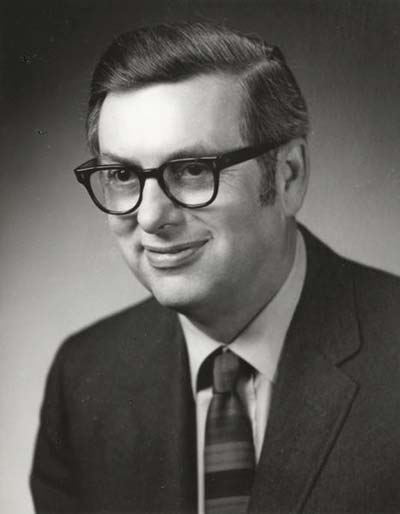
Professor Reid Bryson was the founder of the University of Wisconsin-Madison’s meteorology department and Center for Climatic Research, and the first director of the Institute for Environmental Studies. Reid was one of the pioneers of modern climatology and among the first to explore the influence of climate on humans and human culture.
He gained fame for his studies of past and future climate, the relationships between climate and the biosphere, and the interaction of climate and human societies. A polymath, Bryson’s scholarly interests ranged from studies of archaeology and geography to geology and limnology, and he tied them together through an abiding interest in weather and climate.
An innovative researcher and influential teacher, Reid excelled at work in the field, studying climate on every continent, and was especially interested in the influence of climate on human history and culture. In retirement, he traveled the famed Silk Road to sate his many interests in history and human cultures.
Bryson was prescient in grasping the depth and breadth of the many connections between climate, the environment and human society, according to John Kutzbach, UW-Madison professor emeritus of atmospheric and oceanic sciences and one of Bryson’s students. “His interdisciplinary interests and knowledge of these topics allowed him to see connections that others missed and to initiate studies that are still at the cutting edge of climate research.”
Reid Allen Bryson was born in Detroit on June 7, 1920. He earned a bachelor’s degree in geology from Denison University in 1941 and his doctorate in meteorology from the University of Chicago in 1948, the same year he founded the University of Wisconsin’s meteorology department. During World War II, Bryson was a major in the Weather Service of the U.S. Army Air Corps, making forecasts from Guam for the B-29 air crews on the first high-altitude bombing missions over Tokyo.
Reid and his wife, Frances, raised four children after moving to Madison. In his spare time, Reid enjoyed a wide range of hobbies, including poetry, weaving, and extensive travels throughout the world.
He also indulged in many scholarly interests and in doing so forged a model of interdisciplinary research that was decades ahead of a trend now firmly established in higher education. “Now, interdisciplinary studies is almost like a mantra,” explains Jonathan Martin, the current chair of the department Bryson founded. “Reid Bryson was almost 40 years ahead of the curve. It came organically, out of his own curiosity and many interests.” Reid analyzed ancient tree rings to deduce past climate and studied fossil pollen to learn that arid parts of India were once much wetter environments. He went on to devise a system of land use to help reduce the overgrazing that had made the Indian landscape drier.
“Through field studies and travels to all the continents, he developed a unique understanding of the relationship between ‘climata’ and ‘biota’ – the complex array of variables that link the diverse climates of the planet to its equally diverse ecosystems,” according to Kutzbach. In 1970, Bryson was instrumental in establishing the UW-Madison Institute for Environmental Studies, now known as the Gaylord Nelson Institute for Environmental Studies. He was its first director, serving until 1985. While at the institute, Bryson helped put in place the curriculum for undergraduate courses in environmental studies as well as programs for graduate studies in climate, water and land resources.
“He was a masterful synthesizer and communicator of information,” recalls John A. Young, a UW-Madison professor of atmospheric and oceanic sciences and a Bryson colleague. “He very effectively took climatologic knowledge and applied it to human history. He was a Renaissance man of our science. He was unique.”
We acknowledge text from Terry Devitt at University Communications, UW-Madison.